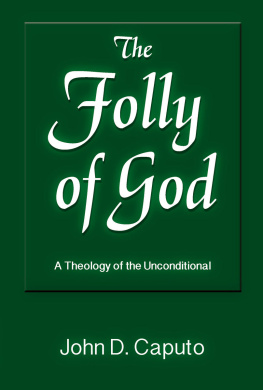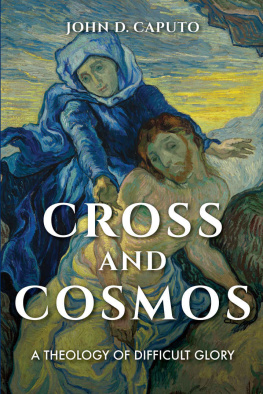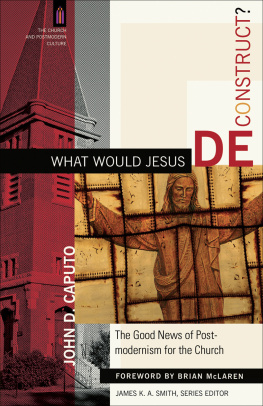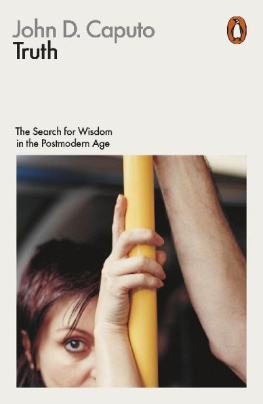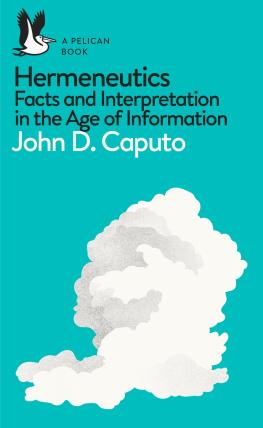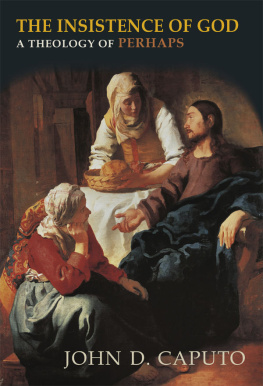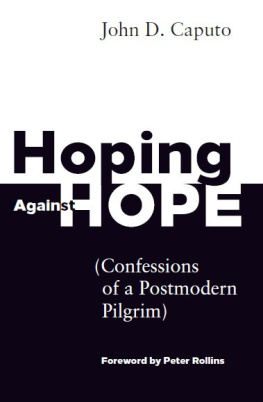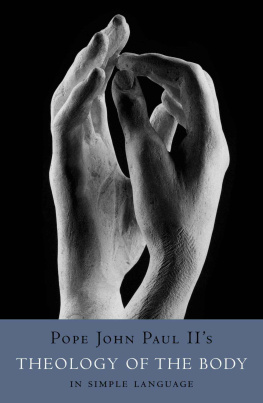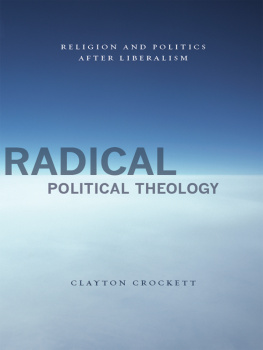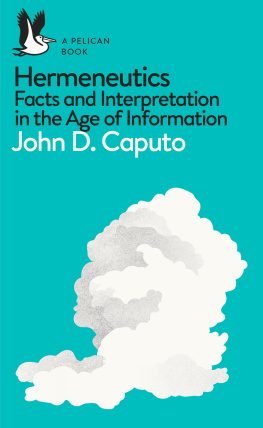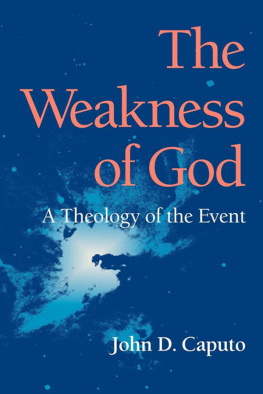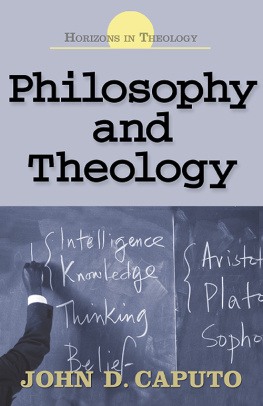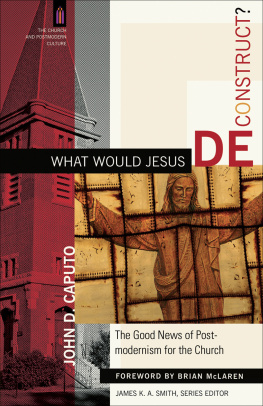


Copyright 2016 by John D. Caputo
All rights reserved. Printed in the United States of America. No part of this book may be used or reproduced in any manner whatsoever without written permission except in the case of brief quotations embodied in critical articles and reviews. For information address Polebridge Press, Willamette University, 900 State Street, Salem, OR 97301.
Cover and interior design by Robaire Ream
Library of Congress Cataloging-in-Publication Data
Caputo, John D.
The Folly of God : a theology of the unconditional / by John D. Caputo.
pages cm
Includes bibliographical references and index.
ISBN 978-1-59815-171-8 (alk. paper)
1. Postmodernism--Religious aspects--Christianity. I. Title.
BR115.P74C35 2016
231--dc23
2015031857
Contents
Abbreviations
| 1 Cor | 1 Corinthians |
| 1 Thess | 1 Thessalonians |
| Col | Colossians |
| Eph | Ephesians |
| Matt | Matthew |
| Phil | Philippians |
| Ps(s) | Psalm(s) |
| Rev | Revelation |
The Interests of Theology
At a time when Jews expect a miracle and Greeks seek enlightenment, we speak about Gods Anointed crucified! This is an offense to Jews, nonsense to the nations; but to those who have heard Gods call, both Jews and Greeks, the Anointed represents Gods power and Gods wisdom; because the folly of God is wiser than humans are and the weakness of God is stronger than humans are.
1 Cor 1:2225
The real interest of theology is not in God. At the end of the day, it is in the best interests of theology not to be content with God. Theology has other interests. I will not say higher interests because what could be higher than God? God after all is the ens supremum, the Supreme Being, the highest being of them all. When we give glory to God we regularly add in the highest. If we are to allow the interests of theology to be measured by who or what is highest, God comes out on top, hands down. That is a competition that prudence dictates I decline to enter. Instead, I will strike out in the opposite direction. Conceding the high ground to the other sidelets call that high theology, theology that can have no higher interest than Godmy contention is that theology has deeper interests than God. We could call the opposing tendency deep theology but I prefer to call it radical theology, meaning getting down in the dirt and digging down into the roots of theology.
I also contend that because high theology is too often high and mighty it is well described as strong theology, and that strong theology has been too strong for its own good. So my general line of argument is that the best interests of theology would be served were it not so high and mighty. The cause to which I regularly contribute, by contrast, is of a more modest and timid sort. This I call weak theology, in keeping with what St. Paul calls the weakness of God (1 Cor 1:25) where weak theologians are markedly afraid of heights and of being too puffed up, not only by knowledge but also by power. So when it comes to God and theology, to thinking about God, let us get our bearings right from the start: where there is height, I head for the depths; where there is a show of strength, I prefer weakness. Instead of high and mighty, we radical theologians seek the deep and weak! If we want to change theologyor anything elsechange the metaphors.
In what follows I first address my fear of heights (chapters 14). I start with a religiously salutary and genuinely theological atheismabout God in the highestwhich I treat not as the end of theology but the beginning (chapter 1). I then unearth the depth dimension that is sought in radical theology in terms of the unconditional, which I propose, entirely conscious of the paradox, is the only condition under which we can think through what is really going on in theology. To speak of a theology of the unconditional, as I do here, is for me a felicitous tautology; once you say the one you say the other and you are repeating yourself, happily, because it bears repetition (chapter 2). That leads me to propose what I call a certain proto-religion, or religionless religion, or religion without religion, which turns on a deeper resonance with the unconditional in our lives, which subtends the furious and futile debate between theism and atheism, or religion and secularism, going on up above (chapter 3). I conclude this leg of the argumentabout the depth of the unconditionalby asking, given the increasing incredulity with which garden variety religion is greeted, how much longer will religion last? (chapter 4).
As my advocacy of weakness, which belongs no less to my idea of a theology of the unconditional, requires no less an explanation, I then take up the logic, if it is a logic, of weakening (chapters 59). First, I explain what perversity made me take the side of weakness instead of strength in order to speak of God, who is quite famous for being omnipotent (chapter 5). That allows me to get to what the weakness of God really means and why this figure, which is not of my devisingit comes from First Corinthians!has so strong a hold on me (chapter 6). That in turn allows me to introduce another perverse proposal: to approach God not as a necessary being, as in classical theology, but in the more radical terms of the may-being of a divine perhaps (chapter 7). That brings me to a crucially important point in my argument, upon which everything before and afterwards depends in my theology of the unconditional, the dynamics of call and response (chapter 8). I then take up the final implication of the logic of weakening, that the weakness of God requires in turn a corresponding weakening of theology itself as a form of discourse. To this end I turn to the kingdom of God, the coming of which was announced by Jesus, which, I contend, is to be addressed not in a bombastic theology of omnipotence but in the softer, lower, and more dulcet tones of what I call a theopoetics (chapter 9). This could not be more important, because the kingdom of God, after all, is not a particular case in point in Christianity; it is the whole point.
In the concluding section (chapter 10), I will bring the entire analysis to head, or maybe better back down to earth, by addressing head-on a question I have brought down on myself. As I have no wish to disagree with Jesus, the problem I have is very considerable. Assuming that the argument I have made on behalf of the theology of the unconditional holds up, how can the rule of Godbasileia, regnum, imperiumbe carried out without a high and mighty God to do the ruling? Is that not the heights, or the depths, of folly? Or might the opposite be the case: that if the High and Mighty One ever showed up, everything in the kingdom of God would be ruined? To put it rather pointedly, does the kingdom of God need God? Or might the opposite be the case, that God needs the kingdom of God? (chapter 10)
Having thereby completed a trilogy I did not set out to write, it is beginning to look like there is a method to my madness. If so, it is because I have adopted the method of madness itself, the logic of a fools logic (morologia), remembering that in French
Next page
